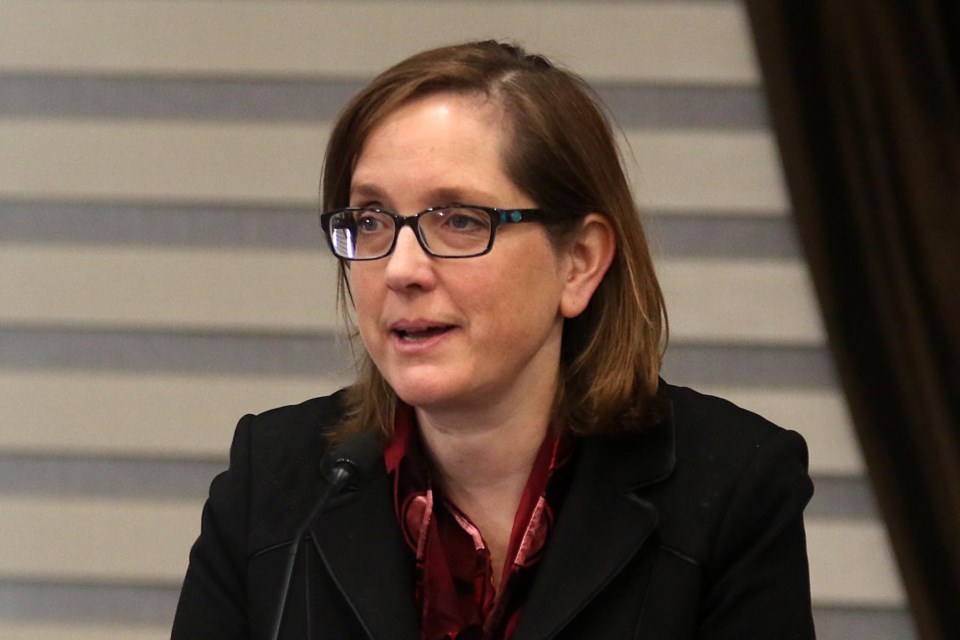THUNDER BAY - While the city of Thunder Bay is receiving additional doses of the COVID-19 vaccine due to the high number of cases, the medical officer of health would still like to see the provincial government acknowledge the situation by designating the city as a hotspot.
“I feel the ministry is connecting and I am able to put the information forward to them and there has been a response to that,” said Dr. Janet DeMille, medical officer of health with the Thunder Bay District Health Unit. “But it would be nice to have that more recognized or more acknowledged at the provincial level.”
According to DeMille, the district is already seeing some of the benefits that other hotspots in the province have received, including the increased vaccines and support for the Thunder Bay Regional Health Sciences Centre.
The hotspot designation is applied by provincial government to identify areas that have experienced high rates of COVID-19 infection throughout the entirety of the pandemic.
“That’s what they had intended with the use of the word hotspot as part of the phase two strategy,” DeMille said. “I think it’s challenging with our current situation that they are using that word for other areas but not ours. We are the hotspot in Ontario right now for sure. I think it is good to have that recognized.”
The Thunder Bay District Health Unit reported 40 new cases of COVID-19 on Thursday, bringing the cumulative total to 2,533 since the pandemic began. The number of active cases in the district sits at 406.
Last week, the health unit also confirmed that someone from the district screened positive for a COVID-19 variant of concern.
The health unit has not received results from a confirmatory test on that sample, which can take several weeks. But DeMille said other individuals who are connected to the first sample are being tested.
“I heard today there is a separate report of an individual who’s sample has screened positive for the variant, so we might be showing at least two today or tomorrow on the provincial spreadsheet,” DeMille said.
Public health officials across the province are concerned about the rise of COVID-19 variants, which has resulted in the province entering a third wave of the pandemic.
DeMille said all samples from the district are screened for variants and when any test comes back as screening positive it goes on for further testing.
If an individual does screen positive for a variant, the health unit undertakes extensive contact tracing to mitigate any further spread.
“We do follow-up on all these individuals and apply enhanced guidance for case and contact management, especially when there is a variant of concern and we do test other individuals and very much try to control the spread from any of those individuals, as we do for all individuals,” she said.
More vaccines on the way
Last week, it was announced the district will be receiving additional doses of the Moderna vaccine to compliment the weekly doses of the Pfizer vaccine already allocated to the district.
According to DeMille, the district received an additional 1,000 doses of the Moderna vaccine on top of the regional allocation and it has the capacity to administer 5,000 doses per week.
“We are looking forward to getting more vaccine,” she said. “I think the supply is increasing anyway and we are preparing to move forward on administering those vaccines when it comes. I do know more is coming our way and I will continue to let them know we are prepared to receive more.”
The time between first and second doses was expanded to 16 weeks based on recommendations from the National Advisory Committee on Immunization, though seniors living in congregate settings can still receive a second dose after 21 to 28 days.
DeMille said deferring the second dose allows for more people to be immunized sooner, creating more immunity for the population.
“The evidence though, and it has been reviewed, it does show that it is okay for most people to defer the second dose up to four months, and that frees up more doses to give to more people, and that has tremendous value,” she said.
Lockdown remains in effect
The district remains under a grey lockdown and DeMille said she has spoken with community leaders who are not seeing the same high rates of infection as Thunder Bay. However, because the COVID-19 response framework is applied at the health unit level, it is unlikely district communities will see any lifting of restrictions early.
“I do appreciate the frustrations people have, businesses, and all those situations,” DeMille said. “But right now that is how the framework is applied, at the health unit level. Even though they’ve advocated and I’ve brought it up in my conversations, I don’t get the sense that there are any other options.”
When it comes to the city of Thunder Bay, DeMille is reminding the public that COVID-19 is essentially everywhere and there is no one area or areas that are experiencing higher numbers.
“I can look at the addresses, we’ve mapped the addresses out so we have a sense if there are any hotspots or not. They are literally covering the whole city. There is no place in the city where somebody around you doesn’t have COVID,” DeMille said.
“My message is we need to assume COVID can be anywhere, regardless of where you are or where you live and to take all those appropriate precautions if you are outside your house to protect yourself and protect others around you.”